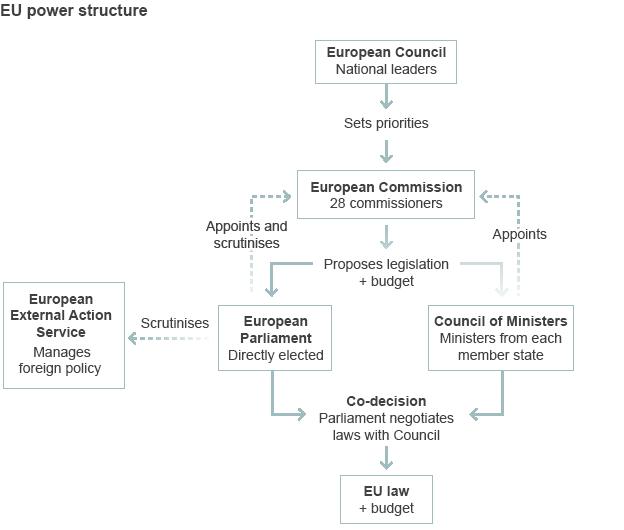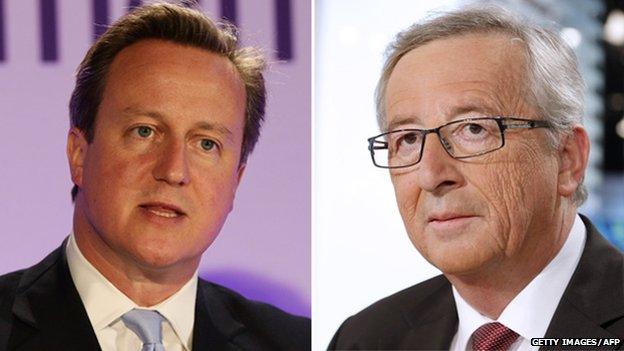Juncker EU presidency: UK loses opposition allies
- Published
The British Prime Minister does not back Mr Juncker for the role, as the BBC's Europe editor Gavin Hewitt reports
David Cameron's bid to block Jean-Claude Juncker becoming the next European Commission president looks set to fail after his allies changed tack.
German Chancellor Angela Merkel had given the British prime minister hope after agreeing to a vote on the issue if there was no consensus.
But both the Netherlands and Sweden now say they will back Luxembourg's ex-PM.
Mr Cameron says Mr Juncker's nomination ignores the "pro-reform message" sent by European voters last month.
The EU summit starts on Thursday after leaders first commemorate the 100th anniversary of the start of World War One in Ypres.
That ceremony will be followed by a working dinner on the EU's long-term policy agenda in Brussels, before EU leaders make a decision on the Commission presidency on Friday.
The Commission president runs the EU's executive, which drafts EU laws, enforces EU treaties - imposing fines on member states if necessary - and negotiates major trade deals. The Commission also acts as a powerful watchdog over national budgets.
When asked by the BBC on Thursday if he thought his appointment was a done deal Mr Juncker smiled and replied "I think".

Analysis: Cameron's allies against Juncker fall away by Gavin Hewitt, BBC Europe editor
There is, of course, an element of domestic politics at play with David Cameron's strategy. Facing down the lacklustre Mr Juncker seems to be playing well with British voters.
But David Cameron is also fighting for a principle that nominating Mr Juncker would be an "irreversible step which would hand power from the European Council [heads of state and government] to the European Parliament".
Why does that matter? Because the prime minister in his bid to sell a reformed Europe to the British public needs the reverse to happen: a shift in power back to national parliaments. This fight over the former prime minister of Luxembourg is part of the longer struggle to reform the EU.


Objections
Mr Cameron has said he will demand an unprecedented vote if Mr Juncker's name is tabled, so that EU leaders are forced to justify their support for the veteran politician in public.
In the past such sensitive appointments have been decided through informal negotiations in the European Council.
The UK prime minister believes Mr Juncker is too much in favour of closer political union and might block fundamental reform of the EU.
He also objects to the idea that EU leaders are allowing the European Parliament to effectively make the choice, since Mr Juncker was the lead candidate of the pan-European centre-right group that topped May's elections, the European People's Party (EPP).
A spokesman for Mr Cameron said "we are going to continue to make our case - if you believe in a point of principle the right thing is to follow that through.
"The importance of reform and change and that being reflected in the Commission has been our message from the start - that will be our message today and tomorrow."
Jean-Claude Juncker is confident he will become the next EC president if "common sense prevails"
The UK's Europe minister David Lidington said choosing the Commission president from among the parties' leading candidates risked making the EU executive "a creature of the European Parliament".
He also told BBC Radio 4's Today programme the issue Mr Cameron had with Mr Juncker was not because of his personality, but a point of principle.
"The idea that we're now seeing, that the bosses of the party factions in the European Parliament should get together and stitch up in advance the people who the heads of government of the European countries are allowed to vote for is, we think, an abuse of the treaty," he said.
With Hungary's Prime Minister Viktor Orban now Mr Cameron's only supporter, correspondents say Mr Juncker is likely to be overwhelmingly backed as the nomination, even if it does go to a vote.
On Thursday however EU leaders will be united in remembering the fallen of World War One. Ypres is close to Western Front battlefields where hundreds of thousands lost their lives.
Lucy Hockings explains the significance of the Menin Gate.
Damaging row
Chancellor Merkel said on Wednesday that it would be "no tragedy" if Mr Juncker won the Commission's top job with less than unanimous backing.
But Downing Street said that she later agreed with the British PM that a vote should take place if necessary.
A statement from No 10 said she also underlined German support for Britain's continued membership of a reformed EU.
As chair of the eurozone finance ministers, Mr Juncker worked closely with Chancellor Merkel on the emergency bailouts for Greece, Portugal and other debt-laden countries.
Ms Merkel is under strong pressure from her coalition partners - the centre-left Social Democrats (SPD) - and some other EU leaders to back him.
Centre-left leaders including French President Francois Hollande and Italian Prime Minister Matteo Renzi appear to be hoping that Mr Juncker will ease the EU's tough austerity drive. They want a shift away from cuts, and towards economic stimulus measures that could kick-start growth.

Next steps
27 June - European Council expected to nominate Mr Juncker
1-3 July - First post-election session of new European Parliament
14-17 July - European Parliament votes on nominee for Commission president - expected to back Mr Juncker
September - Parliament grills each nominee for 28-member Commission (one from each member state)
October - Parliament votes on new Commission team
November - New Commission should take office, as should new EU foreign policy chief and new European Council President.

- Published25 June 2014
- Published25 June 2014
